|
|
|
Sort Order |
|
|
|
Items / Page
|
|
|
|
|
|
|
| Srl | Item |
| 1 |
ID:
169033
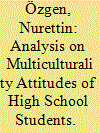

|
|
|
|
|
| Summary/Abstract |
This study explores the links between multiculturality attitudes displayed by high school students and their ethnic identity, religious beliefs, self-identification, and place of residence. The study is based on questionnaires from 2823 students in 17 cities in seven geographical regions across Turkey. A five-dimension Multiculturality Attitude test was used, which consists of 21 items and was developed by the authors. The data were analyzed with the non-parametric tests Kruskal–Wallis and Mann–Whitney-U. According to the results, there are statistically significant differences across all categories of the scale.
|
|
|
|
|
|
|
|
|
|
|
|
|
|
|
|
| 2 |
ID:
169034


|
|
|
|
|
| Summary/Abstract |
Despite the official policy of genocide denial, the Armenian Genocide has been more widely discussed within Turkish society in the twenty-first century, particularly by the intelligentsia, than ever before. However, the more critical approach to the denial of genocide among many in the Turkish intelligentsia is not generally reflected in Turkish literary narratives. Literature is regarded by politicized and nationalist Turkish authors and historians as a discursive space in which to strengthen Turkish official discourse, the voice of denial. The official voice of the state can be clearly discerned in novels published in the period around 2015, due to the historical significance of the hundredth anniversary of the Genocide. However, there are some exceptions – narratives in which the writers seek to engage in cultural resistance, aiming to voice their own political criticism as a mode of social critique. Adopting a sociological approach and a theoretical framework based on historical criticism, this article explores the way Turkish novelistic discourse has responded to the discussion of the Armenian Genocide and Armenian Identity, and examines the representation of otherness (i.e. non-Muslims) in ten contemporary Turkish novels, most of which were published after 2000, when the Armenian issue became more controversial due to certain internal and external factors. .
|
|
|
|
|
|
|
|
|
|
|
|
|
|
|
|
| 3 |
ID:
169032
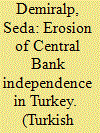

|
|
|
|
|
| Summary/Abstract |
This study provides empirical analysis to show increasing pressures over the Central Bank of Turkey (CBT) throughout the past decade where the CBT gives into such pressures, despite the Central Bank Law, which ensures tool independence. The study suggests that the relations between the government and the CBT reflect recent political changes where the government increased its control over state institutions, following rising costs of losing office. However, this trend not only has economic costs such as a restricted capacity to achieve price stability and sustainable growth but it also limits horizontal accountability of state institutions.
|
|
|
|
|
|
|
|
|
|
|
|
|
|
|
|
| 4 |
ID:
169030
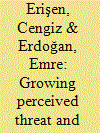

|
|
|
|
|
| Summary/Abstract |
Tolerance is a central concept for a society’s democratic foundations. Many forms of populism threaten tolerance and are a growing concern for consolidated liberal democracies as well developing ones. Right-wing ideology, heightened nationalism, and xenophobic rhetoric toward minorities are threatening social cohesion, public unity, and liberal values. Turkey, subject to various destabilizing recent events, faces specific challenges amid political, social, and economic uncertainties. Using two waves of a nationally representative survey, conducted after each of two general elections in 2015, we studied changes in the behavioral indicators of intolerance in the Turkish electorate. We found that perceived threat and prejudice explain changes in public intolerance during this period. We discuss the implications of our results for the standing of democracy in Turkey.
|
|
|
|
|
|
|
|
|
|
|
|
|
|
|
|
| 5 |
ID:
169036
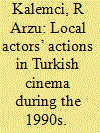

|
|
|
|
|
| Summary/Abstract |
This study analyzes changes in Turkish cinema in the 1990s. During this time, Turkish cinema was exposed to changes resulting from globalization and the foreign domination of cinema that came along with it. More recently, Turkish cinema has seen noticeable growth. By adopting a political economy perspective, this study investigates how the local actors of Turkish cinema, which were on the defensive, were able to overcome significant challenges.
|
|
|
|
|
|
|
|
|
|
|
|
|
|
|
|
| 6 |
ID:
169031
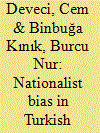

|
|
|
|
|
| Summary/Abstract |
This article analyzes the approach in Turkey on hate speech by evaluating legal regulations, decisions and public responses. We argue that the Turkish case cultivates neither a lenient, nor a restrictive response to hate speech, because a strong nationalist bias seems to be at work in interpreting, penalizing or allowing hate speech. The peculiarity of the Turkish case stems from a prejudice that hate speech might be conducted only against the nation, unity of the state, or the principles of regime, rather than against vulnerable groups or identities. By focusing on the Hrant Dink case among others we try to demonstrate the most striking example of this prejudice.
|
|
|
|
|
|
|
|
|
|
|
|
|
|
|
|
| 7 |
ID:
169035
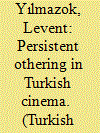

|
|
|
|
|
| Summary/Abstract |
In Turkish cinema, the regular narrative of exclusion or othering of minority ethnic, religious, and gender identities harnesses the nation-building process against groups that function as the ‘constitutive outsider.’ Although recent Turkish cinema has challenged many established cultural patterns, this challenge does not yet extend to stereotyped and heavily gendered constructions of Greek identity. In this paper, I argue that these constructions are persistent, and can be seen in recent films. Specifically, I demonstrate that Greek characters are limited to a few stereotypical names and roles, assigned heavy Turkish accents, and for the most part, confined to female roles depicted primarily as ‘indecent’ and/or objects of the male gaze.
|
|
|
|
|
|
|
|
|
|
|
|
|
|
|
|
|
|
|
|
|